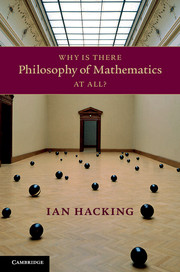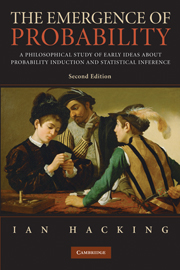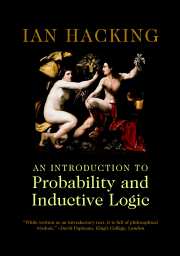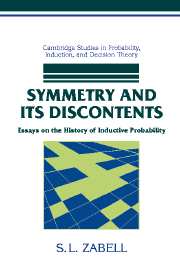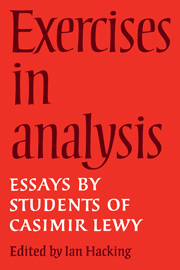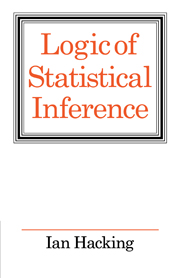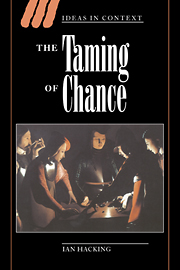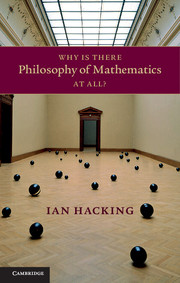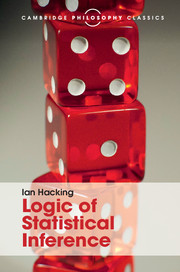An Introduction to Probability and Inductive Logic
Desk Examination Edition
Out of Print
- Author: Ian Hacking, University of Toronto
- Date Published: October 2001
- availability: Unavailable - out of print January 2010
- format: Paperback
- isbn: 9780521005340
Out of Print
Paperback
Looking for an inspection copy?
This title is not currently available on inspection
-
This is an introductory textbook on probability and induction written by one of the world's foremost philosophers of science. The book has been designed to offer maximal accessibility to the widest range of students (not only those majoring in philosophy) and assumes no formal training in elementary symbolic logic. It offers a comprehensive course covering all basic definitions of induction and probability, and it considers such topics as decision theory, Bayesianism, frequency ideas, and the philosophical problem of induction. The key features of the book are a lively and vigorous prose style; lucid and systematic organisation and presentation of the ideas; many practical applications; a rich supply of exercises drawing on examples from such fields as psychology, ecology, economics, bioethics, engineering, and political science; numerous brief historical accounts of how fundamental ideas of probability and induction developed; a full bibliography of further reading. Although designed primarily for courses in philosophy, the book could certainly be read and enjoyed by those in the social sciences (particularly psychology, economics, political science and sociology) or medical sciences (such as epidemiology) seeking a reader-friendly account of the basic ideas of probability and induction.
Reviews & endorsements
'While written as an introductory text, it is full of philosophical wisdom. Moreover, this is wisdom that most students of philosophy need but find very hard to acquire. Hacking explains all the basic ideas of probability theory, the philosophical puzzles they raise, the standard lines of response, their strengths and weaknesses. He writes with the authority of someone who has helped from the debates and understands everything properly, but at the same time he gives a fair hearing to all positions worth taking seriously. At some point in the career of most philosophy students, graduates and undergraduates alike, they read stuff, which uses probabilistic ideas and turn to their teachers for guidance. I can imagine that the teachers' automatic response for some decades to come will be to send these students to Hacking.' David Papineau, King's College, London
See more reviews'Hacking's textbook is likely to become the standard for inductive logic courses. He writes simply, in a lively style, without oversimplification … Lively and original examples drawn from everyday life create the appropriate context to prepare students to think critically about the barrage of statistical arguments that confront us on a daily basis … Hacking's textbook sheds much needed light on the mystique of statistical reasoning.' Katherine van Uum, Grinnell College, Iowa
Customer reviews
Not yet reviewed
Be the first to review
Review was not posted due to profanity
×Product details
- Date Published: October 2001
- format: Paperback
- isbn: 9780521005340
- dimensions: 255 x 177 x 19 mm
- weight: 0.669kg
- availability: Unavailable - out of print January 2010
Table of Contents
A note on the cover illustration
Foreword
Odd Questions
1. Logic
2. How to calculate probabilities
3. How to combine probabilities and utilities
4. Kinds of probability
5. Probability as a measure of belief
6. Probability as frequency
7. Probability applied to philosophy
Answers to the exercises
Further reading
Index
Sorry, this resource is locked
Please register or sign in to request access. If you are having problems accessing these resources please email [email protected]
Register Sign in» Proceed
You are now leaving the Cambridge University Press website. Your eBook purchase and download will be completed by our partner www.ebooks.com. Please see the permission section of the www.ebooks.com catalogue page for details of the print & copy limits on our eBooks.
Continue ×Are you sure you want to delete your account?
This cannot be undone.
Thank you for your feedback which will help us improve our service.
If you requested a response, we will make sure to get back to you shortly.
×

